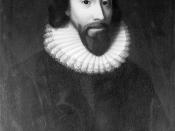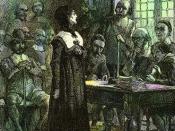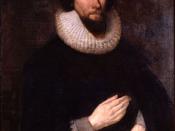The Puritan Dilemma by Edmund Morgan
John Winthrop's "Puritan dilemma" arose out of his life long effort to accomplish two goals: to secure a community dedicated to upholding every aspect of God's will and to do this within the context of everyday life. His first challenge dealt with the depravity of the Church of England in the early seventeenth century and how to escape its wickedness without withdrawing from the world. Then, with the founding of the Massachusetts Bay Colony in 1630, a decade of domestic problems took center stage as the "separatist impulse" and excessive purity threatened colonial stability. Winthrop's last hurdle occurred in the realm of foreign affairs with the possibility of English intervention in colonial religious practices. On all three occasions, he used moderation and reason combined with the responsible exercise of authority to temper and defeat those forces standing in the way of his ultimate two-fold purpose.
As Edmund Morgan's work shows, by his life's end, Winthrop had created in himself a powerful example of how to address the central "Puritan dilemma:" how a righteous man does right in a world that does wrong (182).
According to Puritan belief, every member bore responsibility for the Church of England's behavior, and all would be held accountable to God for its sinfulness (16). For this reason, Winthrop had a personal stake in England's incompetence, and he now confronted "the paradox that required a man to live in the world without being in it" (27) for the first time on a major scale. How could he rectify his moral responsibility to God without neglecting his duty to this world? Among his peers, the opportunity to colonize the New World and create a Puritan "city on a hill" arose as an increasingly attractive solution, but Winthrop was still reluctant: "would...


